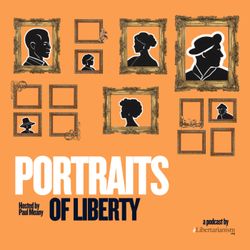Share

Portraits of Liberty
A show that investigates the lives and philosophies of thinkers throughout history.
Latest episode

78. A Son of the Forest: William Apess
19:07||Ep. 78Born of Pequot descent, William Apess was the first Native American to publish a full-length autobiography. Apess became a Methodist minister and one of the most piercing moral critics of white Christian America’s hypocrisy. Drawing on the Bible, the Declaration of Independence, and the language of natural rights, Apess demanded that liberty, equality, and self-government apply to Native peoples as much as they were to anyone else. From his autobiography, A Son of the Forest, and his fiery essay “An Indian’s Looking-Glass for the White Man” to his leadership in the Mashpee Revolt, Apess held the American republic accountable to its professed creed.
More episodes
View all episodes

The Forgotten Polish Republican: Wawrzyniec Goślicki and the Rights of a Free Commonwealth
52:04|In the late sixteenth century, Wawrzyniec Goślicki authored De Optimo Senatore (The Accomplished Senator), a bold argument for a politics grounded in natural law, civic virtue, and the constitutional liberties of the Polish–Lithuanian Commonwealth. Joined by Walker Haskins, our editor for intellectual history, Paul Meany, covers Goślicki’s career as a bishop, diplomat, and political theorist. They discuss Goślicki’s vision of checks on executive power and his rejection of arbitrary rule.
76. A Quiet Rebel: José Castellanos
15:04||Ep. 76This episode explores the often overlooked classical liberal tradition of civil disobedience through the remarkable story of José Castellanos Contreras, a Salvadoran diplomat who, during World War II, defied orders and international law to save thousands of Jewish people from Nazi death camps. His story, forgotten for decades, embodies the liberal conviction that moral law supersedes state authority.
75. Japan's Ignored Anarchist: Andō Shōeki
14:35||Ep. 75This episode explores the thought of Andō Shōeki, a Japanese philosopher who denounced feudal hierarchies, Confucian dogma, and the samurai class. Shōeki’s vision of a natural, egalitarian society based on voluntary cooperation challenges the notion that anarchist or libertarian thought is uniquely Western. His work is an early critique of state power, anticipating later theories by figures like Franz Oppenheimer.
74. Benjamin Franklin: A Versatile Genius, with Guest Mark Skousen
39:51||Ep. 74In this episode, economist and historian Mark Skousen joins us to discuss his latest book, The Greatest American: Benjamin Franklin, The World's Most Versatile Genius. Skousen highlights Franklin’s remarkable range of life experiences from scientist and inventor to statesman, printer, and philosopher—showing why Franklin has long been considered by historians to be the most modern of the Founding Fathers. Skousen reflects on Franklin’s lessons on liberty, enterprise, and the pursuit of a flourishing life.
73. Joseph Hiam Levy: A Forgotten Radical for Liberty, with guest Matt Zwolinski
28:27||Ep. 73J.H. Levy was a prominent but now largely forgotten voice in the individualist intellectual circles of Victorian Britain, known for his passionate defense of self-ownership and voluntary social cooperation. Matt Zwolinski introduces listeners to Levy’s life, intellectual context, and the principles that drove his activism in organizations like the Personal Rights Association.This episode is also available to watch on Youtube.
72. Liberty With an Asterisk: Black Americans In the Revolution Era
20:51||Ep. 72In this podcast, we revisit the lives of Elizabeth Freeman, Lemuel Haynes, and James Forten, three Black Americans who lived through the contradictions of the Revolutionary era and helped expand its ideals. These three did not passively await emancipation but seized the rhetoric of liberty and used it to reshape law, religion, and civil society. Their stories illuminate the untold Black contribution to the founding vision of the American Republic.